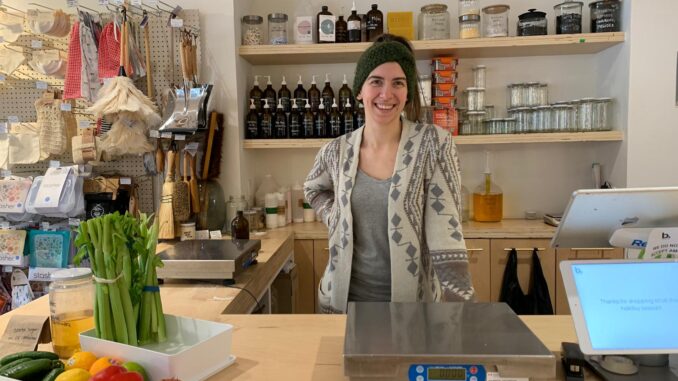
Dayna Stein, owner of bare market, 2023. (Photo: Maria Jose Lopez)
Months before the Covid-19 pandemic lockdown, Dayna Stein took a chance and opened bare market; a low-waste grocery store in which people can find fresh vegetables, eggs, artisanal shampoos, and grains in bulk. Danya quit her job in 2017 and delved into the world of retail in 2019 with hopes of combating the plastic waste problem in Toronto. She got inspired by a small store in Vancouver when she was young.
"There was this little store in Vancouver called The Soap Dispensary and going there was the only way in my life that I was making tangible change. It was a long commute, but didn't feel was living my values."
On average Canadians throw 3.25 million tonnes of plastic waste every year and only 9% of this is recycled; the rest of the waste ends up in landfills, waste-to-energy facilities, and sadly, the environment. More than 80% of marine litter, which affects both fresh and saltwater habitats alike, is plastic waste that comes from packaging.
The Mission
With bare market, Stein aims to reduce as much plastic waste as possible and encourages others to do the same. Low-waste stores or zero-waste stores like Dayna's are shops in which everything is sold in bulk and there is no plastic packaging allowed. Shoppers are encouraged to bring their own jars and containers to carry their groceries. If the customer doesn't have their own jars, containers can be rented and returned later.
“I think the first six weeks we helped divert 26 thousand pieces of pastic, single use plastic, from landfills (...) So even though you might not feel like you’re creating such a big impact when you come here, your collective impact with everyone else that is coming here, is massive.”
A waste-free lifestyle is still a fairly new concept in Canada’s mainstream social circle. Dayna recognises this, and goes out of her way to explain and introduce her customers to the benefits of creating a waste free eco-system. She can be seen going through every little aspect of waste management that affects our environment in her interactions.
Bare market is working towards a waste free environment, and the store speaks for itself. The store is completely free of plastic packaging, FEFO products are kept in refillable containers, the bakery is self-service and the store encourages people towards a more waste free lifestyle through DIY kits.
Not the Only Option
The store recognises other stores as well, and encourages their customers to not throw out any plastic or glass packaging they might have acquired. Through a simple exchange system, the bare market willingly pays their customers who bring back plastic or glass packaging or gives up store credit that can be used for any purchase in the store.
Toronto households waste over $1300 dollars worth of food every year. While the government has encouraged the citizens to reduce their annual waste, it hasn’t been effective. Stores like bare market are trying to change that by raising their voice against waste and reaching out to more people through a personal touch. Dayna’s prints are all over the bare market; they can be seen through her blog posts or her efforts to introduce a cleaner lifestyle to more people across the city. It might be endless but as Dayna says, it is to make the world a better place.
"I want to do things that are good for the planet and good for the people in it. And hopefully, like bare market as is, is inspiring people in younger age groups to want to make an impact too."
Watch the story here:

Be the first to comment